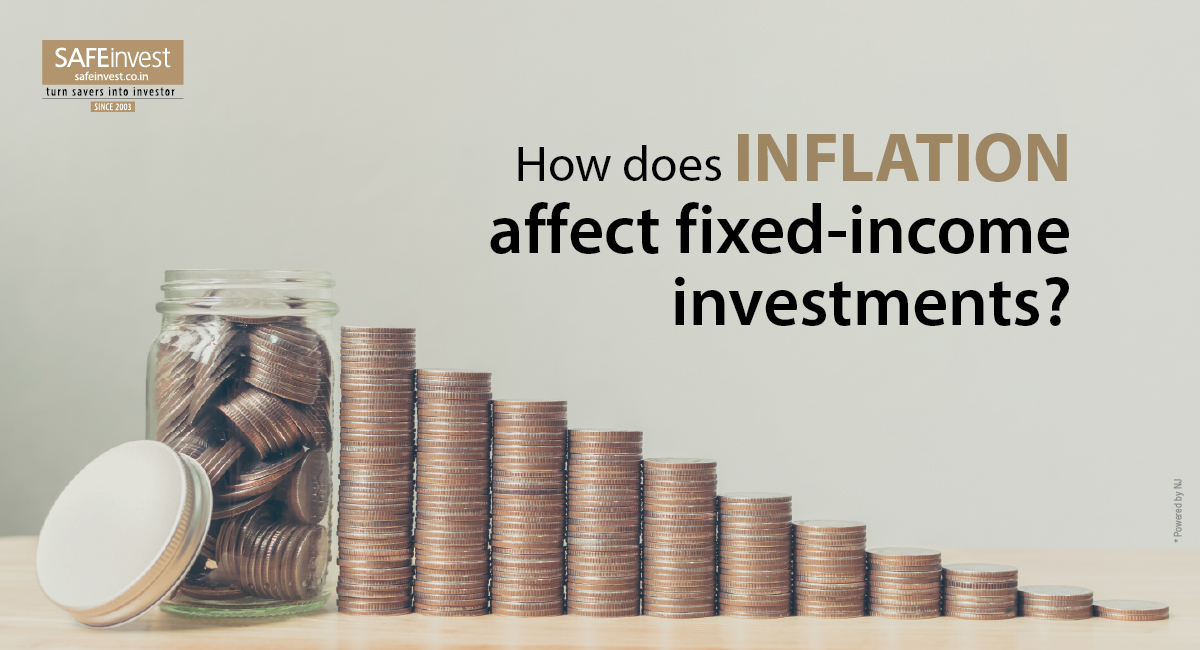How does inflation affect fixed-income investments?

How Inflation Impacts Your Earnings?
When planning your finances, preserving the value of your money is as important as growing it. You must have noticed that your purchasing power changes over the period of time, but your income levels may or may not change. This phenomenon is because of inflation. So, while your nominal earnings appear unchanged or even increased slightly, the value they hold in the real world could be diminishing.
While most investors focus on returns, fewer account for how inflation takes away their gains. Let’s explore how inflation directly affects the value of your earnings and how some investment instruments are more exposed to this impact than others.
What is Inflation?
When beginning the financial journey, investors move towards fixed income investment options because of the predictable returns they offer. But here’s where inflation becomes a crucial factor.
Inflation is the increase in the price of goods and services over time, which reduces the purchasing power of money. So if the annual inflation rate is 6%, something that cost Rs.100 last year will now cost Rs.106. If your returns remain constant, your real earnings would essentially fall.
Real Rate of Return = [(1 + Nominal Rate) / (1 + Inflation Rate)] - 1, wherein
- The nominal rate of return is the actual or adjusted return an investor receives on an investment.
- Inflation Rate is the rise in the price of goods and services, and
- Real earnings refer to the actual value of the earnings or returns on your investment after adjusting for the effect of inflation.
This becomes even more relevant when you rely on fixed-income investment instruments like bonds, deposits, or fixed-income mutual funds.
How does Inflation Affect Investments?
When it comes to fixed income investment, inflation can quietly reduce the real returns you earn. Here’s how:
- Buying Power: Even if your investment gives you a 7% return, and the inflation rate is 6%, your real return is just 1%. While the nominal return remains unchanged, your actual buying power has barely increased.
- Loss of value: While fixed-income investments offer set returns, these don't adjust for increasing inflation. Consequently, keeping funds in low-interest investments for extended periods amplifies inflation's detrimental effect on the investment's real growth.
- Limited Flexibility: Priortising capital preservation & steady income are over liquidity & growth, eventually limits their flexibility. They are ideal for conservative investors but not for those looking for higher returns.
- Impact on retired investors: Retirees often depend upon fixed-income mutual funds or pensions to sustain themselves. High inflation can mean that their retirement corpus may no longer be sufficient to maintain the same lifestyle, causing long-term stress on finances.
Strategies to Mitigate Inflation's Impact on Fixed Income Investments
If you’re relying heavily on fixed income investment, consider these steps to stay ahead of inflation and protect your money’s value:
- Diversify Smartly: Don’t put all your money in one place. Include a mix of asset classes to balance the effect of inflation.
- Monitor Inflation Trends: Keep an eye on inflation rates and how the market is reacting. Consult a Financial Products Distributor who helps you make timely decisions on your investment portfolio.
- Reinvest returns regularly: Don’t let your earnings sit idle. Reinvest them to keep your money growing and reduce the effect of inflation.
Final Thoughts
Inflation is like a silent leak in your wallet, which may not be obvious today, but over time, it can drain your financial well-being if not addressed smartly. If you have leaned on fixed income options for their safety, it’s important to also look at their limitations when the cost of living keeps climbing.
While these instruments serve as a solid foundation for stability, no single approach is bulletproof. Think of your money as something that should not only rest safely but also grow meaningfully, even when prices rise.
Make room for adaptability, and regularly revisit your portfolio. Blend reliability with growth. And most importantly, stay informed because understanding how the economy affects your earnings puts you one step ahead in building lasting wealth.
Mutual Funds are subject to market risks. Read all the scheme-related documents carefully.
